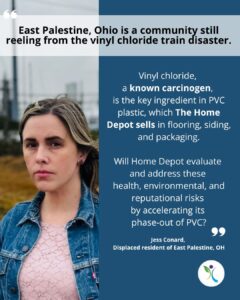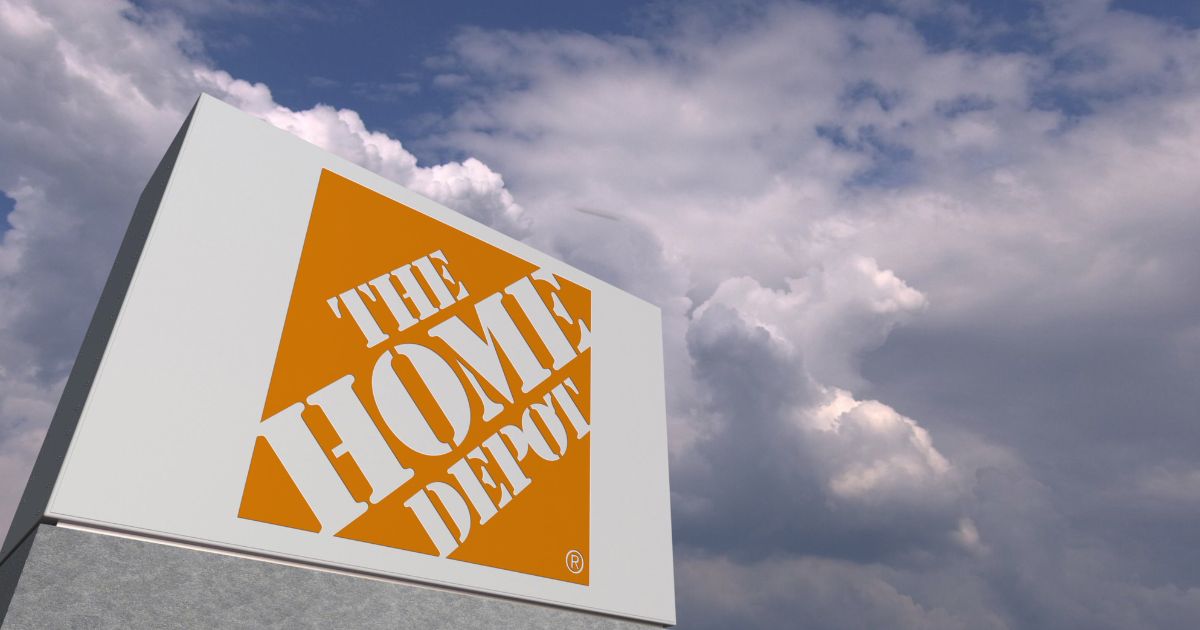At its recent annual shareholder meeting, The Home Depot came under renewed pressure from investors and impacted communities to take action on PVC plastic (polyvinyl chloride)—the toxic material used in building materials and packaging that poses serious health and environmental risks.
This rising pressure builds on The Home Depot’s past leadership in chemical safety, like phasing out phthalates in flooring and eliminating methylene chloride and PFAS in select products. Now, investors and the public are calling on The Home Depot to take the next step.
26,000 Home Depot customers demand action on PVC
Ahead of the meeting, more than 26,000 petition signatures were delivered to The Home Depot’s leadership urging action on PVC. A powerful coalition of national and state-based nonprofits—including Beyond Plastics, Breast Cancer Prevention Partners, Clean Water Action, Defend Our Health, Hip Hop Caucus, League of Conservation Voters, North Carolina Conservation Network, the Plastic Pollution Coalition, and Toxic-Free Future—joined forces to demand that The Home Depot phase out PVC plastic and the adoption of safer materials, like linoleum flooring.
The petition was first launched last fall by Toxic-Free Future and East Palestine resident, Daren Gamble.
This surge of public engagement echoes previous successful efforts to move the industry—like the campaigns that pushed Lowe’s and The Home Depot’s leadership on methylene chloride. Once again, collective action is calling for market change.
Why PVC—the “poison plastic”—is under scrutiny
PVC is widely recognized as one of the most hazardous plastics in use today. It’s made using toxic chemicals like vinyl chloride—a known human carcinogen—and ethylene dichloride, which is considered a probable human carcinogen. PVC products often contain harmful additives too, including phthalates and toxic flame retardants, which have been linked to reproductive and developmental harm.
When PVC is burned, it can release dioxins, some of the most toxic substances on the planet.
Governments are responding:
- Washington state recently categorized PVC packaging as a “priority product” for likely regulation;
- New York state is considering a statewide PVC packaging ban; and
- In the EU, there is growing momentum to restrict PVC under the EU’s REACH chemical safety law.
Investors call out the risks
Our petition was directly referenced during the shareholder meeting—alongside tough questions about the company’s continued use of PVC.
“More than 20,000 Home Depot customers have signed petitions demanding the company phase out this hazardous plastic in private label and brand name packaging and products, highlighting the growing reputational risks for the business.”
– Conrad Mackerron, As You Sow
Conrad Mackerron from As You Sow spoke in support of a plastic pollution shareholder resolution, which received 17% of the vote, representing a remarkable $43 billion in investor shares. In an era of anti-ESG backlash in boardrooms, this vote sends a powerful signal that plastics like PVC pose a material business risk—one that could affect The Home Depot’s brand trust, regulatory exposure, and long-term business performance.
Voices from East Palestine, Ohio displaced resident
Investor concerns were echoed by Jess Conard, a resident displaced by the 2023 East Palestine, Ohio train derailment that released vinyl chloride.
Jess’s question to the company leadership was raised:
“Home Depot has made positive steps in removing PVC packaging in private-label products from its shelves. When will the work be expanded beyond the company’s own brand and when can investors expect more shelf space to be allocated to safer alternatives to PVC building materials in stores?”
The Home Depot responded—but stopped short:
“Thank you for your question. We regularly evaluate our assortment to assess the needs and expectations of our customers for high quality products with lower environmental impacts. As innovation on alternatives to PVC plastics continues to develop, we will continue to look for ways to encourage our private brand and national brand suppliers to incorporate them into the products we offer. This type of collaboration with our suppliers helped us to achieve our prior goal of excluding EPS foam and PVC film from all new private brand packaging last year.” (emphasis added)

While the response acknowledged the issue and noted recent progress, along with a willingness to explore alternatives, the company stopped short of making a clear commitment to move away from PVC in brand-name packaging and building materials like vinyl flooring.
Now is the time to lead
Communities like East Palestine can’t wait. Neither can the millions of customers—like contractors and homeowners—who expect safer, healthier choices.
The Home Depot says it’s listening. But now it must lead—by delivering measurable, time-bound action to maintain trust and position the company as an ESG leader in the retail sector.
We believe The Home Depot has both the market influence and track record to lead the industry once again by committing to a timeline for phasing out PVC in brand-name packaging and high-volume building materials such as flooring.
Sign our petition to The Home Depot: build a safer future and ban PVC!





